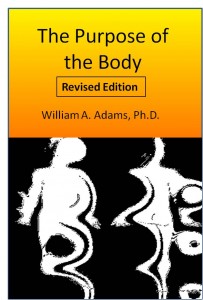 Mental experience occurs inside the physical body, does it not? You’ve never had an experience that happened on the other side of the room while you were on this side. No. Mental activity is always “in here.” What does that mean, exactly? What is the relationship between the mind, introspectively understood, and its extremely intimate but uncommunicative partner, the body?
Mental experience occurs inside the physical body, does it not? You’ve never had an experience that happened on the other side of the room while you were on this side. No. Mental activity is always “in here.” What does that mean, exactly? What is the relationship between the mind, introspectively understood, and its extremely intimate but uncommunicative partner, the body?
This essay proposes that what is taken for granted as the self-existent, biological body is instead a concept, a projection of mentality. The physical body is a badly articulated idea, created by the linguistic and self-aware Social Self strand of consciousness. From that confusion, the concept of the body is projected outward, away from subjectivity, and reified into a self-existent object: “the body.”
What then is the purpose of the body, if it is “only” a concept? The mind needs the idea of embodiment to guarantee its psychological individuality, and its survival. Is there any way this new thesis can be reconciled with the theory of biological evolution? Some suggestions are offered. Consequences of re-thinking the relationship of mind and body include a reconsideration of cognitive information processing, death, and metaphysics.
ISBN 978-0-9837177-3-7
32,45 words. Approx. pages: 130. $2.99 Revised Edition
Buy it at Amazon: bit.ly/Purpose-Body (ebook)
Author’s Note:
I always knew this idea was going to be a hard sell, that the physical body is “merely” a concept, an idea of the mind, not a self-existent biological object. The alternative, that the body is just the body, a biological object, is so deeply, profoundly ingrained in our habits of thought, speech and culture, that it is virtually impossible to question it. But that’s what I did.
I came up with this idea from introspection, and from analysis of what other authors have said. My conclusion is that what we think of as the body is “just” an idea, although it is misleading to say it that way. It doesn’t mean that the body is a figment of the imagination. I’m talking about a concept that is so culturally embedded that you, nor I, nor any individual, can readily change it or reconceptualize it. Wouldn’t it be great if you could simply think away pain, aging, disease, death? Alas, that’s not how it is. The concept of the body is culturally constructed at a sub-personal level and it can’t easily be changed.
What difference does it make then, if it’s an idea you can’t change, or a biological object you can’t change? There are huge differences. Even though “the body” is a culturally rigid mental concept, it’s still a mental concept. Mental. That means it is, in fact, susceptible to change by mental means. The book gives some examples of how we, as a culture, have radically changed the structure and function of the body over time, with everything from cochlear implants to birth control pills. Other cultures have their own ways of changing the nature of the body. Even individuals can and do make significant changes around the margins. Thinking of the body as a concept instead of as a biological fact, has major implications for how a person thinks about life, health, and death.
I already know you won’t believe it. I hardly believe it myself, but the arguments are very compelling, it seems to me. Either way, you should read the sample, then buy the book, then tell me what you think.
To Order:
www.smashwords.com Search on title, author, or ISBN (first edition only)
www.barnesand noble.com Search on title or ISBN (First edition only)
www.amazon.com in the Kindle Store, by title, ISBN, Author (Revised Edition)
